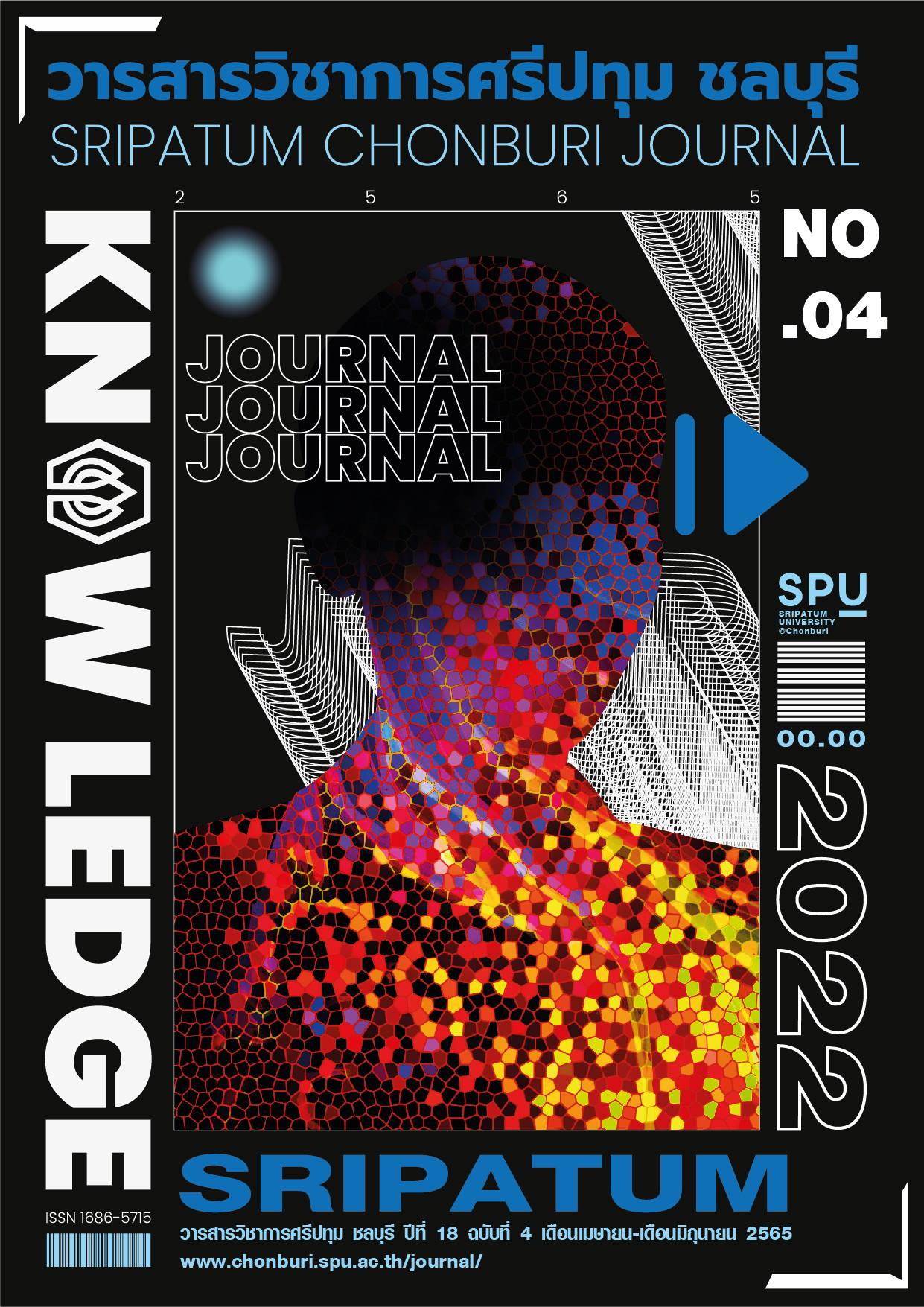THE DEVELOPMENT OF ONLINE TEACHING-LEARNING PLATFORM ON CONTROL OF THE OPERATION OF INFORMATION SYSTEM USING FLIPPED CLASSROOM APPROACH COMBINED WITH CASE-BASED LEARNING FOR UNDERGRADUATE STUDENTS IN THE SCHOOL OF INFORMATION TECHNOLOGY
Keywords:
online teaching-learning platform, control of the operation of information system, flipped classroomAbstract
The objectives of this research were: 1) to develop an online teaching-learning platform on control of the operation of information system using Flipped Classroom Approach combined with Case-based Learning for undergraduate students in the School of Information Technology, 2) to evaluate the efficiency of online teaching-learning platform in comparing with standard criteria of 80/80, 3) to find the index of effectiveness and achievement in learning, and 4) to study the effectiveness of experts and learners' opinions on learning with the platform. 24 undergraduate students were selected through purposive sampling technique. The tools used in this research included a developed online teaching platform, an achievement test, a platform quality assessment questionnaire by experts, and a questionnaire and interview with students' opinions. The collected data were analyzed through a statistical software program and reported in percentage, mean, standard deviation and t test. The results showed that the efficiency of the developed online teaching-learning platform was 82.22/83.08, which was consistent with the standard criteria of 80/80. The effectiveness index of this platform was .9115. The student’s achievement score was significantly higher, by comparing before and after using the platform, with significance level of .05. The score level of platform obtained from experts was 4.32 indicating that the developed platform is suitable to be used as online lesson, and satisfying for students (score level 4.45).
References
ดรุณี ปัญจรัตนากร และคณะ. (2563). การพัฒนาแพลตฟอร์มระบบบริหารจัดการเรียนรู้เกี่ยวกับทฤษฎีและนวัตกรรมการบริหารการศึกษา. ใน การประชุมวิชาการและ
เผยแพร่ผลงานวิจัยคัดสรรสาขาวิชาศึกษาศาสตร์ระดับชาติ (หน้า 1-8). นครราชสีมา: สมาคมสถาบันอุดมศึกษาเอกชนแห่งประเทศไทย.
นิคม ถนอมเสียง. (ม.ป.ป.). เอกสารประกอบการอบรมเรื่อง การตรวจสอบคุณภาพแบบสอบถาม (ออนไลน์). เข้าถึงได้จาก:
https://home.kku.ac.th/nikom/item_relia_validity_2007_u1.pdf [2564, 1 ตุลาคม].
อดุลย์ ไชยเสนา, สุริยะ วชิรวงศ์ไพศาล และพงษ์ศักดิ์ ผกามาศ. (2565). ระบบบริหารจัดการเรียนรู้ออนไลน์วิชาทัศนศิลป์โดยใช้เทคนิคห้องเรียนกลับด้านสำหรับ
นักเรียนระดับชั้นประถมศึกษาปีที่ 4. วารสารการศึกษาและนวัตกรรมการเรียนรู้, 2(1), หน้า 51-67.
Baytiyeh, Hoda. (2017). The flipped classroom model: When technology enhances professional skills. International Journal of Information
and Learning Technology, 34(1), pp. 51-62.
Das, Ashish, et al. (2019). Flipped classroom pedagogy: Using pre-class videos in an undergraduate business information systems
management course. Education+Training, 61(6), pp. 756-774.
Deng, Liping, et al. (Eds). (2018). New Media for Educational Change. New York, NY: Springer.
Fumasoli, Tatiana, Barbato, Giovanni, & Turri, Matteo. (2020). The determinants of university strategic positioning: A reappraisal of the
organisation. Higher Education, 80, pp. 305–334.
Lyons, Paul, & Bandura, Randall P. (2019). Case-based modeling: fostering expertise development and small group learning. European
Journal of Training and Development, 43(7/8), pp. 767-782.
Lyons, Paul, & Bandura, Randall P. (2020). Stimulating employee learning: the confluence of case-based and self-regulated learning.
Industrial and Commercial Training, 52(3), pp. 171-183.
Nkhoma, Mathews Zanda, et al. (2017). Unpacking the revised Bloom’s taxonomy: Developing case-based learning activities.
Education+Training, 59(3), pp. 250-264.
Raza, Syed Ali, Qazi, Wasim, & Umer, Bushra. (2020). Examining the impact of case-based learning on student engagement, learning
motivation and learning performance among university students. Journal of Applied Research in Higher Education, 12(3), pp. 517-533.
Scott, Catherine Elizabeth, Green, Linda E., & Etheridge, Debra Lynn. (2016). A comparison between flipped and lecture-based instruction in
the calculus classroom. Journal of Applied Research in Higher Education, 8(2), pp. 252-264.
Sinlarat, Paitoon. (2020). The path to excellence in Thai education. RICE Journal of Creative Entrepreneurship and Management, 1(2),
pp. 60-75.
Smith, Kara. (2021). Is it face time or structure and accountability that matter? Moving from a flipped to a flipped/hybrid classroom. Journal
of Applied Research in Higher Education, 13(2), pp. 609-621.
Yin, Pengzhen, et al. (2018). Coping with mobile technology overload in the workplace. Internet Research, 28(5), pp. 1189-1212.
Zainuddin, Zamzami, et al. (2019 a). A systematic review of flipped classroom empirical evidence from different fields: what are the gaps and
future trends?. On the Horizon, 27(2), pp. 72-86.
Zainuddin, Zamzami, et al. (2019 b). Research trends in flipped classroom empirical evidence from 2017 to 2018: A content analysis.
Interactive Technology and Smart Education, 16(3), pp. 255-277.
Downloads
Published
Issue
Section
License

This work is licensed under a Creative Commons Attribution-NonCommercial-NoDerivatives 4.0 International License.
บทความทุกบทความเป็นลิขสิทธิ์ของวารสารวิชาการศรีปทุม ชลบุรี



